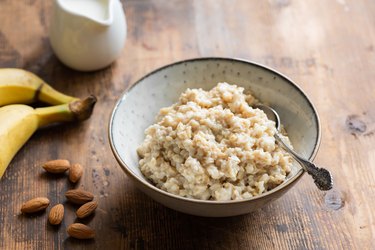
If eating only a serving of oatmeal three times a day doesn't sound like a diet you're likely to stick to in the long run, that's because it's probably not! In fact, there's no reason to subject yourself to an all-oatmeal diet for weight loss — or any kind of single-food diet, for that matter.
Read more: Is Oatmeal a Good Breakfast for Weight Loss?
Video of the Day
Video of the Day
What is the Oatmeal Diet?
Unlike other popular fad diets, the oatmeal diet doesn't have too many guidelines. It's simply broken up into two phases:
- Phase one: In the first phase, which lasts for a week, you replace all three meals with unrefined oatmeal. You can pair it with fruit.
- Phase two: Once the first week is complete, the second phase (also a week long) begins and you eat only oatmeal for two meals, adding in fruits and vegetables throughout the day. Your third meal of each day should be primarily low in fat.
Considering oatmeal is low in calories — only about 150 calories per quarter cup, uncooked — this diet will likely create a calorie deficit, leading to weight loss. However, while this diet may technically help you drop weight, that doesn't automatically deem it a healthy plan.
Why You Shouldn't Try the Oatmeal Diet
Single-food diets such as the oatmeal diet are generally not recommended for healthy or sustainable weight loss. A healthy diet requires a variety of foods from all the major food groups, including fruits, vegetables, whole grains and protein, according to the Mayo Clinic.
Although oats are a healthy source of whole grains and fiber, according to the American Heart Association (AHA), oatmeal lacks key vitamins and nutrients that your body needs. In general, single-food diets usually don't support healthy weight loss, as there's no single food that can provide all the nutrients you need.
How to Eat Oatmeal For Weight Loss
While only eating oatmeal isn't recommended for healthy weight loss, oats can be a great weight management food. Since unrefined oats are whole grains, they contain the germ, bran and endosperm, which contain key nutrients like B vitamins, iron and fiber, according to the AHA. These nutrients are often lost when whole grains are refined.
Fiber, a key nutrient in oats, can not only help improve your blood cholesterol levels (which may lower your risk of heart disease, stroke and obesity) but can also support weight management, according to the AHA. Fiber regulates your blood sugar and slows down the speed at which your food passes through your digestive system, leaving you feeling full for longer, the Academy of Nutrition and Dietetics reports.
The oatmeal diet is probably not sustainable due to its lack of variety, oatmeal may help you lose weight if it's enjoyed as part of a balanced diet. For added nutritional value and flavor, try adding nut butter or fresh fruit to your bowl. Or, you can try making overnight oats for a near-effortless and wholesome breakfast. If weight loss is your goal, be mindful of the calories these add-ins can contribute!
Read more: The 7 Principles of Fat Loss
Is this an emergency? If you are experiencing serious medical symptoms, please see the National Library of Medicine’s list of signs you need emergency medical attention or call 911.